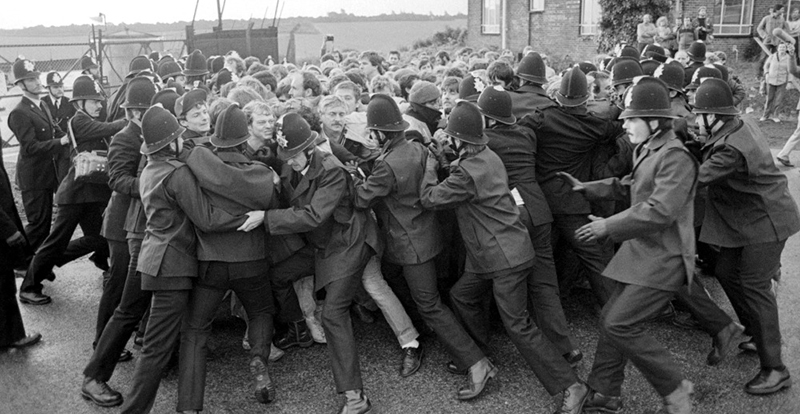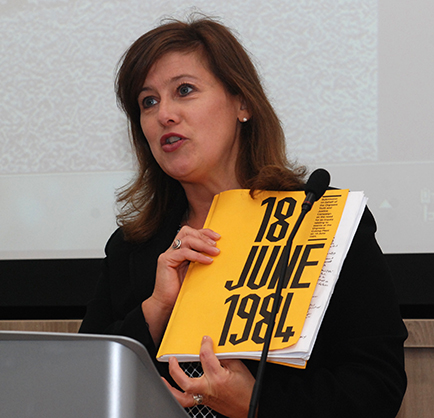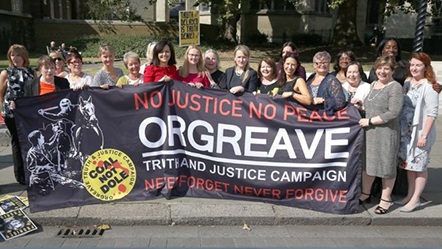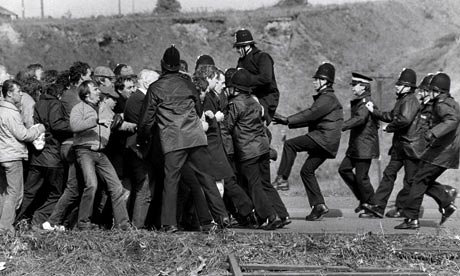Barrister will fight on to achieve a ‘Battle of Orgreave’ inquiry

Tue, 08 Nov 2016 16:19:00 GMT
University guest lecturer Henrietta Hill QC is the legal counsel for the Orgreave Truth and Justice Campaign
 A LEADING lawyer urged University of Huddersfield students to take to Twitter and other social media platforms as part of a campaign to reverse Home Secretary Amber Rudd’s decision not to hold an official enquiry into violent clashes between police and pickets at Orgreave during the 1984 miners’ strike.
A LEADING lawyer urged University of Huddersfield students to take to Twitter and other social media platforms as part of a campaign to reverse Home Secretary Amber Rudd’s decision not to hold an official enquiry into violent clashes between police and pickets at Orgreave during the 1984 miners’ strike.
Henrietta Hill QC (pictured right) is the legal counsel for the Orgreave Truth and Justice Campaign and when she gave a lecture to law students at the University she said that the episode was still highly relevant. She drew parallels with police conduct in the wake of the Hillsborough disaster, alleging that there could have been a “culture of impunity” within the South Yorkshire force.
“For many of the Hillsborough families, Orgreave is unfinished business, because if Orgreave had been dealt with properly there might not have been the cover up that we saw after Hillsborough,” said Ms Hill.
“The issues surrounding Orgreave are still relevant,” she continued. “Many people involved in protest today still say there is heavy-handed policing; there is still concern about the role of the police and the media; and there are still concerns about how officers write up their accounts.”
During her lecture, the London-based lawyer – who specialises in inquests, discrimination law and claims against the police – provided a sequence of reasons why she and co-campaigners believe an Orgreave enquiry should be held.
When striking miners arrived to picket the South Yorkshire coke depot they were met by a “militaristic” police operation – involving officers from all round the country – of a sort that was unprecedented in the UK. By law, police are only allowed to use force in self-defence, and not offensively, but at Orgreave there is a concern that they deliberately set out to incapacitate miners, said Ms Hill.
 A large number of pickets were charged with riot – an offence which could then carry a life sentence – but the trials all collapsed. During the court hearings, it became apparent, continued Ms Hill, that many of the police officers were giving false evidence and doing so on “an industrial scale”.
A large number of pickets were charged with riot – an offence which could then carry a life sentence – but the trials all collapsed. During the court hearings, it became apparent, continued Ms Hill, that many of the police officers were giving false evidence and doing so on “an industrial scale”.
“According to the accounts of officers who have now come forward, the junior officers were told what to put in their statements. The senior officers, it is said by some of the juniors, dictated the beginning paragraphs of their evidence. One can see in these police statements exactly the same paragraphs being used by officers who had come from Merseyside, London or North Yorkshire.”
 Among the other issues raised by Ms Hill were collusion between police and the media, the Government’s political determination to break the strike, and a lack of accountability which meant that the police seemed to have got away with their behaviour. One consequence of this is that in former mining communities there is a continuing distrust of the police, claimed the guest speaker.
Among the other issues raised by Ms Hill were collusion between police and the media, the Government’s political determination to break the strike, and a lack of accountability which meant that the police seemed to have got away with their behaviour. One consequence of this is that in former mining communities there is a continuing distrust of the police, claimed the guest speaker.
When Theresa May was Home Secretary, there were signals that an Orgreave inquiry would be instigated. But new Home Secretary Amber Rudd has now said that there will be no official probe. This was a blow to the campaign, said Ms Hill, but she outlined a number of alternatives to a full public inquiry, such as Panel Review or a Home Affairs Select Committee.
She displayed the Orgreave Truth and Justice Campaign’s website and stated that the campaign had a very active Twitter presence. She urged students in the audience to sign up.
Henrietta Hill QC was introduced to the audience by Philip Drake, a senior lecturer in law who also directs the University of Huddersfield’s award-winning Legal Advice Centre. After her talk, the guest lecturer held a training session for a small team of our law students so they could assist in summarising, categorising and indexing documents for a potential Orgreave inquiry.







